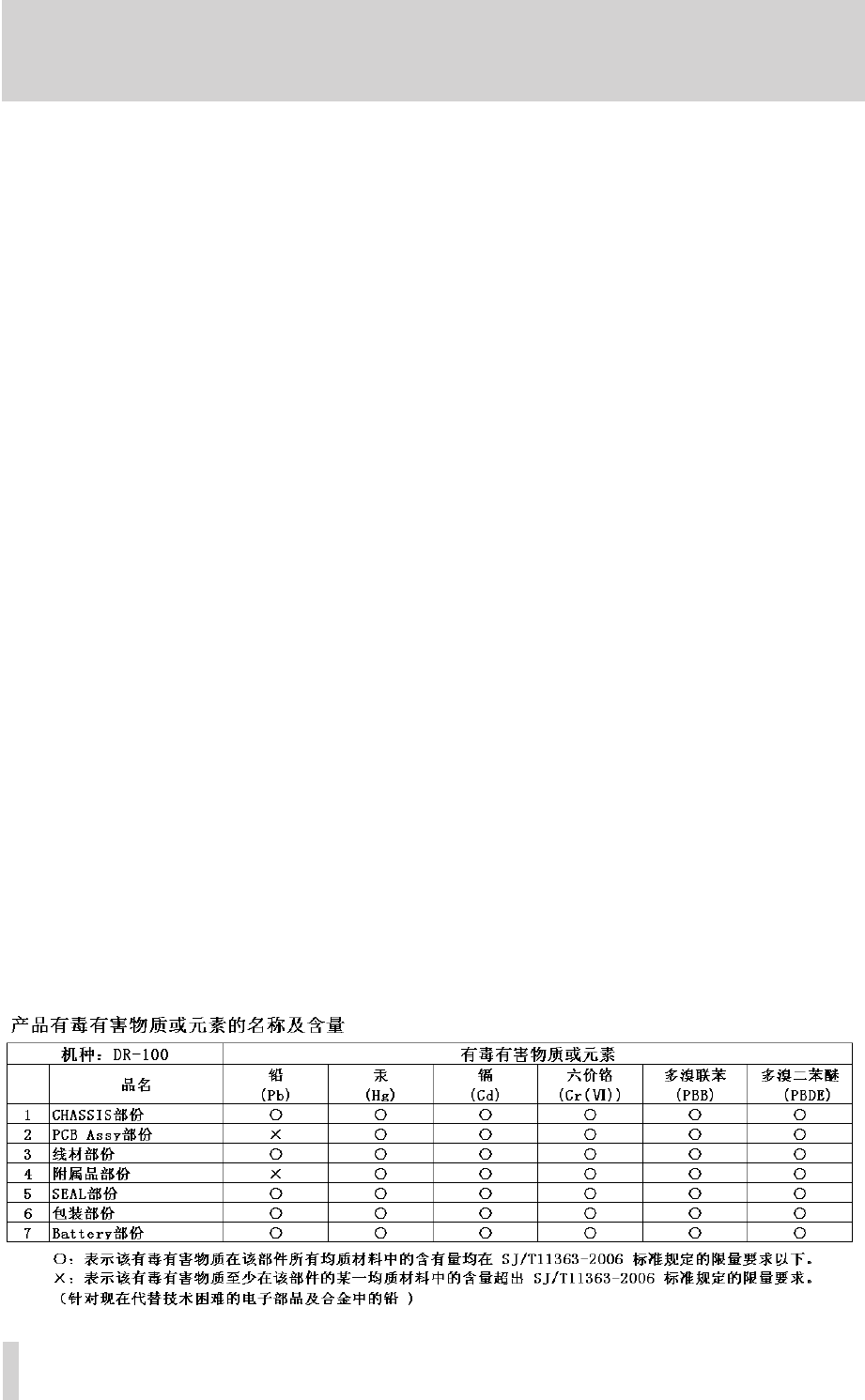
4
TASCAM DR-100
Cautions about rechargeable batteries
This product uses rechargeable batteries. Misuse of
batteries could cause a leak, rupture or other trouble.
Always abide by the following precautions when using
batteries.
If a rechargeable battery leaks, do not touch the
•
leaking fluid with a bare hand. Please consult with
TEAC Corporation if a battery fluid leak occurs.
Battery fluid in an eye could result in loss of vision.
•
If fluid enters an eye, wash the eye immediately
with clean water. Do not rub the eye when washing.
Consult a physician soon after washing. Battery
fluid on the body or clothing could cause injuries or
burns on the skin. Wash with clean water immedi-
ately and then consult a physician.
Do not use any AC adapter other than the model
•
designated for use with this unit. Always use the
designated AC adapter when operating the unit or
recharging the battery with a household AC power
source. Use of an AC adapter other than the desig-
nated one could lead to overheating and cause
injury, burns, fires or stains, as well as battery
ruptures and battery fluid leaks.
Do not put a battery into a fire or leave it or
•
recharge it near a fire, under the sun or in other hot
conditions.
Do not disassemble a battery. Doing so could
•
c au se el ec tr ic sh oc k. P le as e c on ta ct th e
shop where you bought the product or TEAC
Corporation if you want to have a battery inspected
or repaired. When you want to dispose of the prod-
uct, please follow the instruction in the Owner's
Manual to remove the batteries and recycle the
equipment properly.
Cautions about batteries
Never recharge non-rechargeable batteries. The
•
batteries could rupture or leak, causing fire or
injury.
When installing batteries, pay attention to the
•
polarity indications (plus/minus (+/–) orientation),
and install them correctly in the battery compart-
ment as indicated. Putting them in backward could
make the batteries rupture or leak, causing fire,
injury or stains around them.
When you store or dispose batteries, isolate their
•
terminals with insulation tape or something like that to
prevent them from contacting other batteries or metal-
lic objects.
When throwing used batteries away, follow the
•
disposal instructions indicated on the batteries and
the local disposal laws.
Small children may mistakenly swallow a lithium
•
coin battery and it is very dangerous. Keep the
battery and the remote control out of the reach of
small children. In the event a battery is swallowed,
immediately consult a physician.
Do not use batteries other than those specified.
•
Do not mix and use new and old batteries or differ-
ent types of batteries together. The batteries could
rupture or leak, causing fire, injury or stains around
them.
Do not carry or store batteries together with small
•
metal objects. The batteries could short, causing
leak, rupture or other trouble.
Do not heat or disassemble batteries. Do not put
•
them in fire or water. Batteries could rupture or
leak, causing fire, injury or stains around them.
If the battery fluid leaks, wipe away any fluid on
•
the battery case before inserting new batteries. If
the battery fluid gets in an eye, it could cause loss
of eyesight. If fluid does enter an eye, wash it out
thoroughly with clean water without rubbing the
eye and then consult a doctor immediately. If the
fluid gets on a person’s body or clothing, it could
cause skin injuries or burns. If this should happen,
wash it off with clean water and then consult a
doctor immediately.
Remove the batteries if you do not plan to use
•
the unit for a long time. Batteries could rupture or
leak, causing fire, injury or stains around them.
If the battery fluid leaks, wipe away any fluid on
the battery compartment before inserting new
batteries.
Do not disassemble a battery. The acid inside the
•
battery could harm skin or clothing.
IMPORTANT SAFETY PRECAUTIONS


















